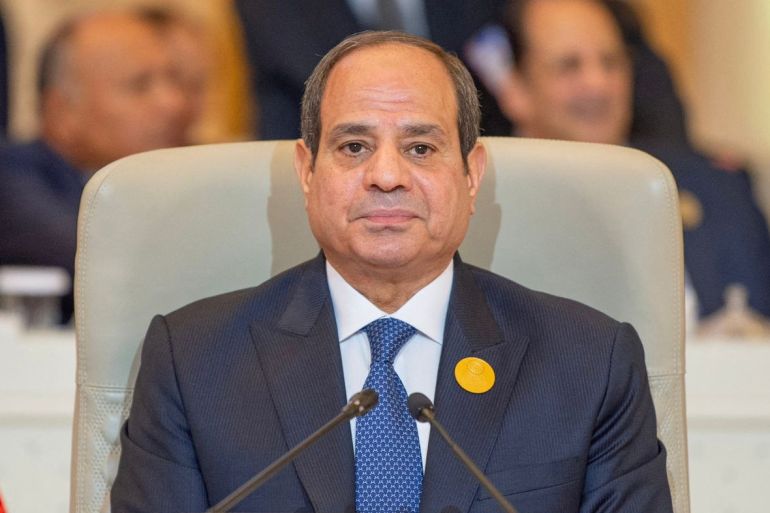El-Sisi sworn in for third term as Egyptian president
New term of six years is supposed to be el-Sisi’s last, according to the constitution.

Abdel Fattah el-Sisi has been sworn in before parliament for his third term as Egyptian president.
El-Sisi’s oathtaking on Tuesday marked what should be his final six-year stretch as leader of the Arab world’s most populous country, unless he again ushers through a constitutional amendment prolonging his tenure.
Keep reading
list of 3 itemsEgypt’s economy will be its biggest challenge during el-Sisi’s third term
Erdogan, el-Sisi urge Israel to halt looming offensive on Rafah
In power for the past decade, the 69-year-old former army chief is set to remain president until 2030.
Speaking before parliament, el-Sisi promised to “remain faithful to my work, my eyes seeing only your interests and this country’s”.
He was re-elected in December with 89.6 percent of the vote in a race pitting him against three largely unknown candidates.
While his message of stability and security resonated with some voters with the war raging in neighbouring Gaza, many showed indifference, instead occupied with rising prices and considering the result a foregone conclusion.
El-Sisi came to power after the 2013 overthrow of the country’s first popularly elected president, Mohamed Morsi. He was re-elected in 2018. In both previous elections, he won with 97 percent of the vote.
He extended the presidential mandate from four to six years and amended the constitution to raise the limit on consecutive terms in office from two to three.
Under his rule, Egypt has jailed thousands of political prisoners, and while a presidential pardons committee has freed about 1,000 in one year, rights groups say that three to four times that many people were arrested over the same period.
Stability and security
Tuesday’s oath also marked the inauguration of Egypt’s New Administrative Capital, located in the desert east of Cairo.
The $58bn megaproject is the crown jewel of el-Sisi’s administration, which has poured billions into Egypt’s infrastructure but has been criticised for enormous debt-fuelled spending.
Last month, Egypt allowed its currency to plummet after a $35bn lifeline secured in a landmark deal with an Emirati wealth fund helped ease chronic foreign currency shortages that have hobbled imports and depleted reserves.
The move and the renewed commitment to extensive reforms, including reducing the role of the state in business, paved the way for an expanded $8bn deal from the International Monetary Fund.
El-Sisi and his supporters say that stability and security in the country are paramount, and that the state is working to provide social rights such as housing and jobs.
They also say the flow of foreign currency will revitalise the economy. However, some analysts are sceptical that there could be any improvement without structural reforms to reduce the outsized role of the army and government in the economy.